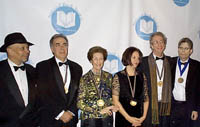2003 National Book Award Winners Announced
 |
|
(l. to r.) Emcee Walter Mosley, National Book Award winners Carlos Eire, Shirley Hazzard, Polly Horvath, and C.K. Williams, and author Stephen King.
|
Over 900 hundred people gathered on Wednesday, November 19, at the New York Marriott Marquis Hotel for the 54th annual National Book Awards Ceremony and Benefit Dinner. Walter Mosley emceed the black tie event. Mosley, who has long championed and advocated young writers, offered a bridge-building theme for the evening and said in his opening remarks, "You've got to be in the world to change it."
Shirley Hazzard, who brought home the Fiction Award for The Great Fire (FSG), took Stephen King, the recipient of this year's Medal for Distinguished Contribution to American Letters, to task in her acceptance speech. King had talked of closing the divide between popular literature and literary literature. Hazzard said, "I want to say in response to Stephen King that I don't regard literature … as a competition." She also said that it was a delight to be in the company of others in the room, adding that she was "impressed by the variety" of the finalist's work. "There was no uniformity, except in the wish to do well by the English language," she said. After the awards ceremony, Hazzard told BTW that "the other books had every reason to win."
 |
 |
 |
 |
The Nonfiction winner was Carlos Eire, author of Waiting for Snow in Havana: Confessions of a Cuban Boy (Free Press/S&S), a March/April 2003 Book Sense 76 Pick. C.K. Williams' The Singing (FSG) won in the Poetry category, and Polly Horvath, author of The Canning Season (FSG), took the prize for Young People's Literature.
When Eire, wearing a laurel wreath his wife had made, thanked the National Book Foundation for the award, he said that the "sad irony" of the evening was that if he had written the book in his homeland, Cuba, he would be in prison. In Cuba, he said, "there is no freedom to write and to read…. [In Cuba] everything the NBA stand for is negated." Eire closed his comments declaring his urgent wish that his compatriots might soon be able to "speak freely once and for all."
Williams, who had been nominated before, skipped the usual roster of thank-yous and, instead, told attendees, "Since my wife isn't here, I thought I'd read a poem," for which the audience clapped in appreciation. He read "Doves," which was recently published in The New Yorker. Prior to the awards ceremony, Williams told BTW that he was very pleased to be a finalist, but also jokingly noted that because he had won the Pulitzer, "if I don't win tonight, I won't be stripped of everything."
Young People's Literature winner Polly Horvath made just a few short comments at the podium.
"Thank you to my wonderful editor of 16 years, Margaret Ferguson," said Horvath. "And thank you to the committee of the National Book Awards. I'm really honored." Later that night, seemingly less nervous than when she had accepted her award, Horvath quipped about the weight of the award statue. "It's a heavy experience," she told BTW. "I'm very happily shell shocked. I'm in a constant state of amazement." Horvath said she has a new book due out next fall (The Peppins and Their Problems, FSG).
Prior to the awards announcement, the National Book Foundation presented the Medal for Distinguished Contribution to American Letters to author Stephen King. In introducing King, Mosley said that King's work "celebrates everyday men and women. He takes everyday lives and makes them heroic…. He makes them transcend the muck."
As King's walked to the podium, he received a standing ovation and wild applause. Once at the microphone, he announced, "I'm delighted to be here, but as I've said before, in the last five years I'm delighted to be anywhere," referring to his near fatal accident when he was hit by a van.
King quickly addressed the somewhat controversial choice to name him the winner of this year's medal. "There are some people who think it's an extremely bad idea. There are those who think it's an extremely good idea. Most of you here tonight are on my side," King said to the audience.
"But what I want to say is that it doesn’t matter [which side you're on]. What matters is that you're people who speak out passionately about books, and the word, and the page, and, in that sense, we're all brothers and sisters." King went on to champion the cause of popular literature and cautioned that "tokenism is not allowed" and that no one wins "social, academic brownie points for staying out of touch with their culture." Reiterating his point, King urged the house full of publishing execs and writers to "be inclusive rather than exclusive." He closed his remarks by saying, "I hope you find something to read that fills you up." --Karen Schechner

